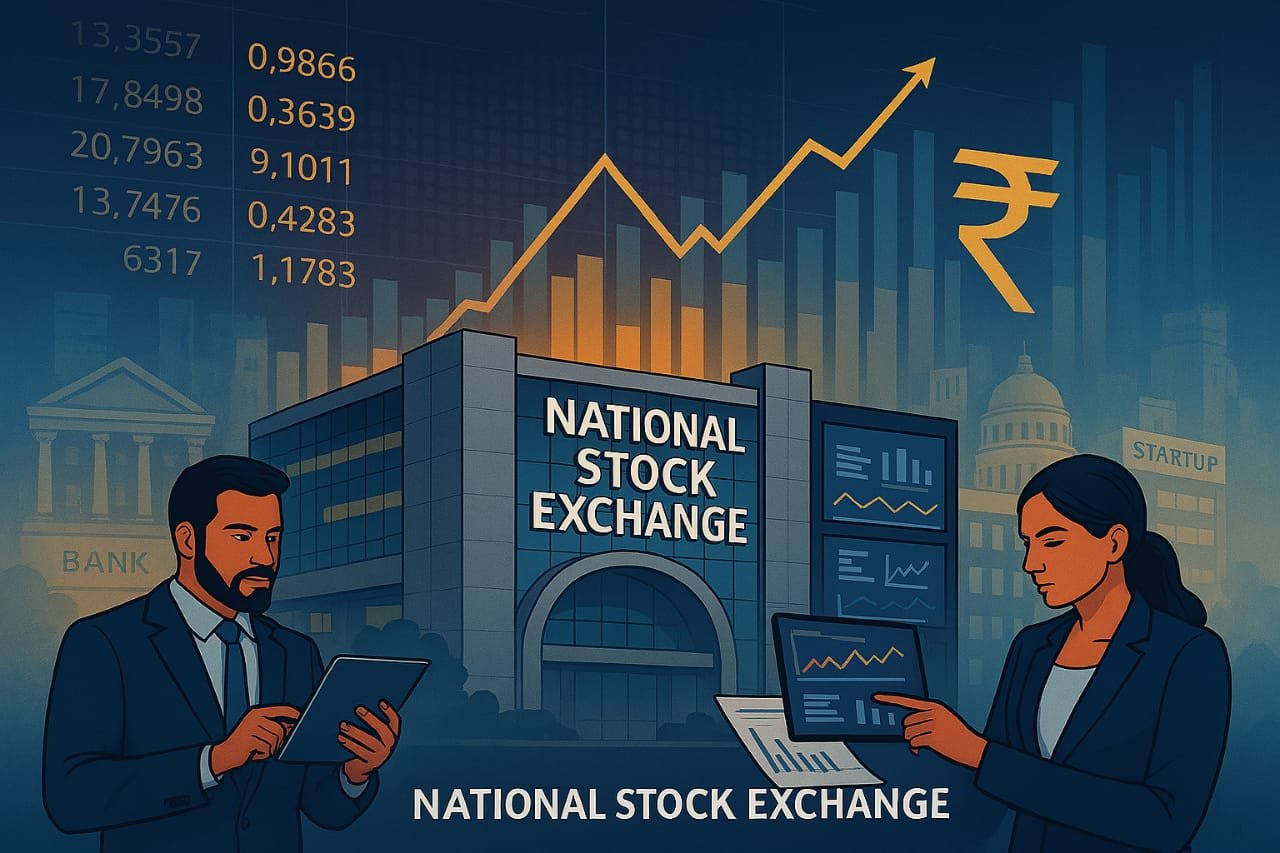National Stock Exchange: The Backbone of India’s Financial Market
When you hear about stocks soaring or crashing in India, chances are you’re hearing news related to the National Stock Exchange (NSE). As India’s largest and most advanced stock exchange, the NSE isn’t just a platform for buying and selling shares—it’s a symbol of financial progress and innovation.

But what exactly is the National Stock Exchange? How does it impact your investments or the broader economy? Let’s break it all down in this deep dive.
What is the National Stock Exchange?
The National Stock Exchange of India Ltd., commonly known as NSE, is India’s first dematerialized, electronic exchange. Founded in 1992 and commencing operations in 1994, NSE revolutionized the Indian capital market by introducing electronic trading systems, removing the need for physical trading floors.
Today, NSE is the largest stock exchange in India in terms of daily turnover and number of trades, and ranks among the top global exchanges.
Key Highlights of NSE at a Glance
| Feature | Description |
|---|---|
| Founded | 1992 |
| Headquarters | Mumbai, Maharashtra |
| Flagship Index | NIFTY 50 |
| Ownership | Public limited company |
| Market Capitalization (2025) | Approx. ₹400 lakh crore+ |
| Global Rank | Among the top 10 stock exchanges globally |
The Birth of NSE: A Revolution in Indian Finance
Before NSE, India’s stock trading was largely paper-based and operated on a trading floor system (think shouting brokers in busy pits). This system was not only inefficient but also opaque, plagued with delays and manipulation.
The Government of India, along with financial institutions and the Industrial Development Bank of India (IDBI), took a major leap by launching NSE in 1992 with the goal of:
-
Promoting transparency and efficiency in capital markets
-
Introducing technology-driven trading
-
Creating a nationwide platform that could democratize investing
This marked the beginning of a digitally empowered Indian stock market.
Why the National Stock Exchange Matters
1. Transparency and Speed at the National Stock Exchange
NSE’s electronic limit order book ensures that all buy and sell orders are matched automatically, ensuring price discovery is fair and quick. This eliminates human bias and favoritism.
2. National Stock Exchange Offers Nationwide Market Access
From a remote village in Uttarakhand to the bustling streets of Mumbai, anyone with internet access and a Demat account can trade on NSE.
3. Low Transaction Costs on the National Stock Exchange
Thanks to automation and scale, NSE maintains low trading fees, making it accessible for retail investors and institutions alike.
4. Diverse Financial Products on the National Stock Exchange
NSE isn’t limited to just stocks. It also offers:
-
Derivatives (Futures & Options)
-
Debt Instruments
-
Currency Derivatives
-
Exchange-Traded Funds (ETFs)

This diversity allows investors to hedge, speculate, or invest for the long term.
NSE vs BSE: A Quick Comparison
Both the NSE and Bombay Stock Exchange (BSE) are pivotal to India’s capital markets. But they differ in several aspects:
| Criteria | NSE | BSE |
|---|---|---|
| Established | 1992 | 1875 |
| Flagship Index | NIFTY 50 | SENSEX |
| Trading Volume | Higher | Lower |
| Technology | Fully automated from start | Automated later |
| Global Rank | Top 10 | Top 10–15 |
✅ Investor Tip: While both are reliable, NSE is often preferred for its liquidity and faster order execution, especially in derivatives.
Understanding NIFTY 50 – NSE’s Pulse
If NSE is the heart, then NIFTY 50 is its beat.
The NIFTY 50 is a benchmark index representing the weighted average of 50 of the largest Indian companies listed on NSE across sectors such as:
-
IT (Infosys, TCS)
-
Finance (HDFC Bank, ICICI Bank)
-
Energy (Reliance Industries, ONGC)
-
FMCG (HUL, Nestlé India)
It provides a real-time snapshot of India’s market sentiment and economic health.
Explore the current NIFTY 50 performance on NSE
My Personal Take: NSE and the Rise of Retail Investors
I remember opening my first Demat account in 2014. Back then, NSE’s user-friendly trading interface, real-time data, and learning resources like NSE’s Investor Education portal made the process smooth—even for a college student with no financial background.
Fast forward to today, platforms integrated with NSE APIs (like Zerodha, Groww, and Upstox) empower millions of Indians to:
-
Invest in IPOs
-
Trade options from their smartphones
-
Track portfolios and analyze charts
The result? A massive surge in retail investor participation, especially post-2020, during the COVID-19 pandemic.
NSE’s Key Innovations and Milestones
Here are some groundbreaking initiatives that set NSE apart:
-
First exchange in India to offer internet-based trading (2000)
-
Launch of NIFTY 50 index derivatives (2000)
-
NSE IFSC (GIFT City): Global trading from India
-
Socially Responsible Investment Index: NSE launched ESG-themed indices to support sustainable investing
NSE also actively supports investor literacy programs and risk management frameworks, ensuring the capital market is not only profitable but also safe.
NSE’s Role in the Indian Economy
The National Stock Exchange isn’t just a trading platform—it’s a critical economic enabler:
✅ Mobilizes Capital for Businesses
Companies raise funds by issuing equity or debt instruments via NSE, fueling growth and innovation.
✅ Reflects Economic Trends
Indices like NIFTY 50 and sectoral indices act as real-time economic indicators.
✅ Promotes Financial Inclusion
With pan-India access and low costs, NSE brings financial markets closer to common citizens.
Risks & Challenges: What Investors Should Know
While NSE is robust, investors must be aware of:
-
Market Volatility: Driven by domestic and global factors
-
Scams & Misinformation: Beware of pump-and-dump schemes or fake tips
-
Technical Glitches: Though rare, exchange outages can disrupt trades
👉 Always rely on credible sources like NSE India or SEBI, and follow sound risk management strategies.
Looking Ahead: What’s Next for NSE?
As India heads toward becoming a $5 trillion economy, NSE is poised to play a central role in:
-
Expanding to global investors via GIFT City
-
Promoting ESG investing and green finance
-
Enhancing AI-driven trading & surveillance systems
-
Bringing IPOs of startups to the forefront
With technology evolving rapidly, we can expect faster, smarter, and more inclusive financial markets.
Final Thoughts on the National Stock Exchange’s Impact
The National Stock Exchange has transformed the way Indians invest, trade, and build wealth. It made the stock market accessible, trustworthy, and dynamic.

Whether you’re a student exploring mutual funds, a professional dabbling in options trading, or a long-term investor chasing compounding—NSE is your gateway to India’s financial future.
🔔 Ready to Explore More?
-
Check out the Share Market Today for real-time updates.
-
Read our guide on Nifty 50 for in-depth insights.
-
Want to learn investing? Explore NSE Investor Education Resources
💬 What’s your experience with the NSE? Share in the comments below!
👉 Don’t forget to subscribe to our newsletter for weekly investing tips, market trends, and analysis!
